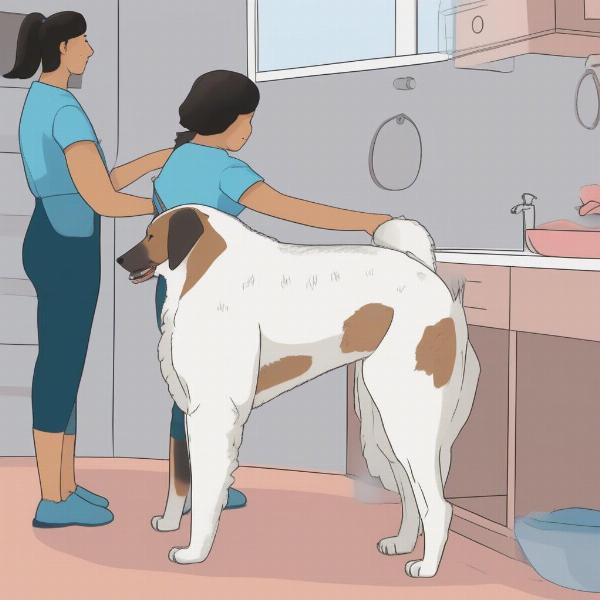An itchy anus in dogs, also known as pruritus ani, can be a frustrating and uncomfortable issue for both the pet and the owner. It can manifest as excessive licking, scooting, or biting at the rear end. Understanding the potential causes, available treatments, and preventative measures can help alleviate your dog’s discomfort and prevent future occurrences. This article will explore the common reasons behind a dog itchy anus, offer practical advice on how to address the problem, and provide tips on keeping your furry friend’s backside healthy and itch-free.
Why is My Dog’s Anus Itchy?
Several factors can contribute to an itchy anus in dogs. Identifying the underlying cause is crucial for effective treatment. These range from simple hygiene issues to more serious medical conditions.
Parasites
Intestinal parasites like tapeworms can irritate the anal area, leading to itching and discomfort. Fleas and mites can also infest the area around the anus, causing intense itching.
Allergies
Just like humans, dogs can suffer from allergies to various substances, including food, environmental allergens, and even certain fabrics. These allergies can manifest as skin irritation, including an itchy anus.
Anal Gland Problems
Dogs have two small sacs located on either side of their anus called anal glands. These glands produce a foul-smelling fluid that is typically expressed during bowel movements. Impacted or infected anal glands can cause significant itching and discomfort.
Dietary Issues
Certain food ingredients can cause sensitivities in dogs, leading to digestive upset and skin irritation, including an itchy anus. Identifying and eliminating these trigger foods can often resolve the issue.
Treating an Itchy Anus in Dogs
The appropriate treatment for an itchy anus depends on the underlying cause. It’s always best to consult with a veterinarian for an accurate diagnosis and personalized treatment plan.
Veterinary Care
Your veterinarian can perform a physical exam, including checking the anal glands, and may recommend further tests such as fecal examinations or skin scrapings to determine the cause of the itching.
Medications
Depending on the diagnosis, your veterinarian may prescribe medications such as anti-parasitics, antihistamines, or antibiotics.
Home Remedies
For mild cases, some home remedies can provide relief. Warm compresses can soothe the irritated area, and adding fiber to your dog’s diet can help regulate bowel movements and prevent anal gland problems.
Preventing an Itchy Anus in Dogs
Taking preventative measures can significantly reduce the likelihood of your dog developing an itchy anus.
Regular Grooming
Regular grooming, including cleaning the area around the anus, can help prevent infections and parasite infestations.
Balanced Diet
Feeding your dog a balanced and nutritious diet can support overall health and reduce the risk of allergies and digestive issues.
Regular Vet Checkups
Routine veterinary checkups allow for early detection and treatment of potential problems, including anal gland issues and parasite infestations.
 Dog Itchy Anus: Grooming
Dog Itchy Anus: Grooming
Conclusion
A dog itchy anus can be a sign of various underlying issues, ranging from minor irritations to more serious medical conditions. By understanding the potential causes, treatments, and preventative measures, you can help your furry friend find relief and maintain a healthy, itch-free backside. Always consult with a veterinarian for an accurate diagnosis and personalized treatment plan. Early intervention is key to preventing further complications and ensuring your dog’s comfort and well-being.
FAQ
- How can I tell if my dog’s anal glands are impacted? Signs of impacted anal glands include scooting, excessive licking, and a foul odor.
- Can I express my dog’s anal glands myself? While it’s possible, it’s best to have this done by a veterinarian or professional groomer to avoid injury.
- What foods can cause allergies in dogs? Common food allergens include beef, chicken, dairy, and wheat.
- How often should I groom my dog? Grooming frequency depends on the breed and coat type, but regular brushing and cleaning are essential.
- What are the signs of intestinal parasites in dogs? Signs include vomiting, diarrhea, weight loss, and changes in appetite.
- Can stress cause an itchy anus in dogs? While not a direct cause, stress can weaken the immune system, making dogs more susceptible to infections and skin irritations.
- Are there any over-the-counter treatments for dog itchy anus? It’s best to consult a veterinarian before using any over-the-counter medications.
Related Articles on ILM Dog
About ILM Dog: ILM Dog is your trusted resource for expert advice on dog care, offering guidance on breed selection, health, training, nutrition, grooming, and more. Whether you’re a new dog owner or a seasoned pro, we provide practical tips and insights to help you provide the best possible care for your canine companion. For personalized advice on dog health and other pet-related services, connect with our experts at [email protected] or call us at +44 20-3965-8624.